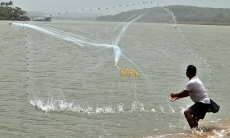Yesterday, I spoke about how we need to overcome the fear of being wrong to really succeed on the Web. Coincidentally, I had lunch with a market research pioneer yesterday who taught me something about fearlessness. Eric Marder told us that he believes he’s the first person to use a computer for market research—back in 1956! But he’s a pioneer in other ways, too.
Eric has made a career out of zigging when everyone else zagged. He has steadfastly focused on understanding how to measure why people choose what they do, in contrast to the trend of conjoint analysis. Most researchers try to draws inferences based on what people do rather than by tracking their true motivations. Bucking the trend requires a level of fearlessness, because you will be criticized.
Inevitably, the subject of fear was raised in the conversation. As the waiter brought the check, Eric warmed to his subject and told this story.
Eric watched a high-diving competition once, a little-known sport where the winner is the person who dives from the highest point. He observed various divers taking higher and higher dives until one was declared the winner.
But the most interesting moment came when the winner was interviewed. The announcer mentioned that the other divers seemed rather nervous as the height kept escalating, and asked if he was also. “No,” the winner replied. “That’s all my coach ever works with me on. If you can overcome the fear, the diving is easy.”
Eric amplified the point with another visualization. “Imagine I laid a 50-foot long board on the floor, and asked you to walk across it without stepping off. It’s easy, right? But supposed I laid that same board between two skyscrapers?”
Adapting to the Internet, whether you work in marketing or PR or somewhere else, is in part a test of how you respond to something new and risky. The things you need to do are not intrinsically hard—it’s the fear that we bring to the tasks that get in the way of our success.



